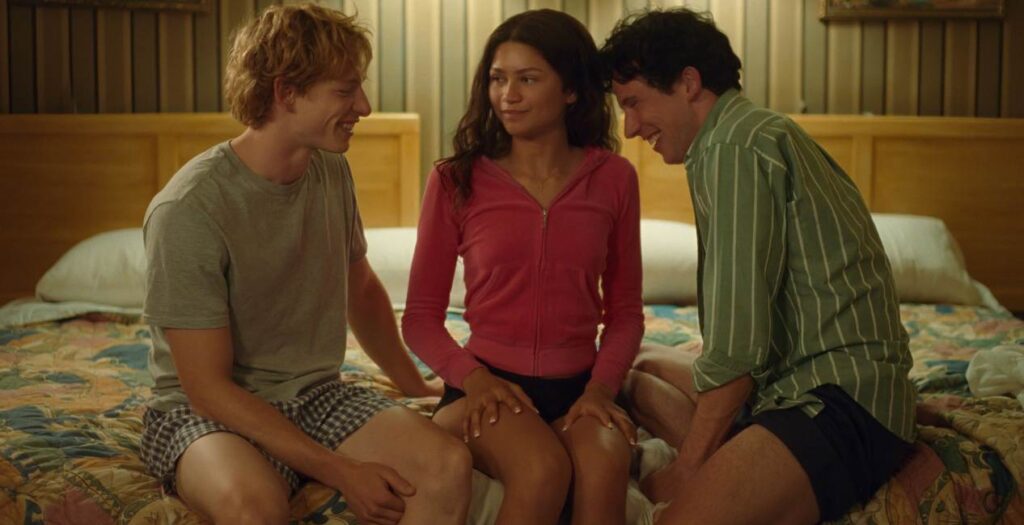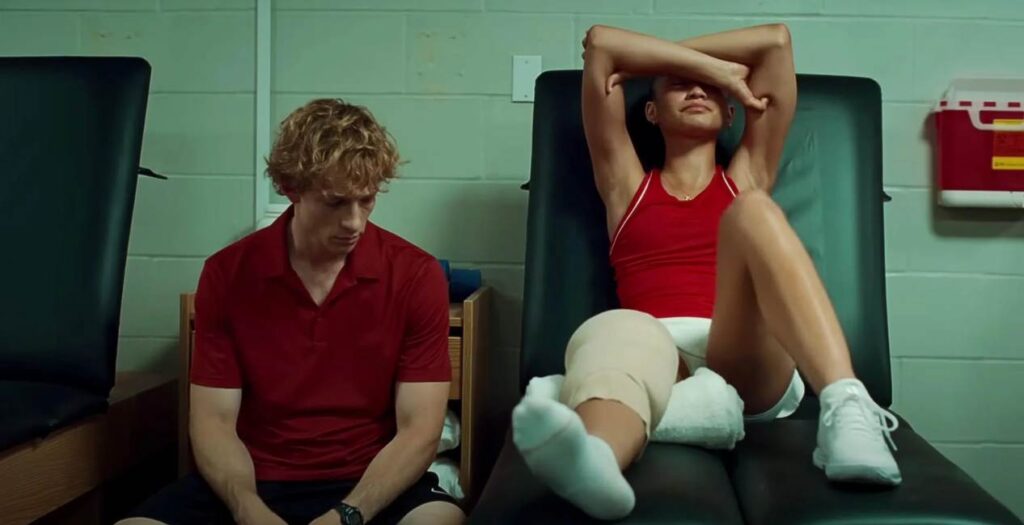Competitive sport is an intimate connection; when it’s one-on-one, it can get romantic. Distributed by MGM Studios (Metro Goldwyn Mayer), Challengers is filmmaker Luca Guadagnino‘s latest take on romance and tension, written by Justin Kuritzkes. The movie stars Zendaya (Dune: Part Two) as Tashi Duncan, a former tennis prodigy turned coach. With “sorry” strongly omitted from her vocabulary, Tashi always puts tennis first. She’s married to a world-famous champion on a losing streak, Art Donaldson (Mike Faist, West Side Story).
Coach Tashi’s strategy for her husband’s redemption involves heading to the bottom of the tennis world and making him a Slam champion at the lowest level first to restore his self-esteem. But, it takes a surprising turn when he must face off against the washed-up Patrick (Josh O’Connor, The Crown) – his former best friend and Tashi’s former boyfriend. As their pasts and present collide and tensions run high, Tashi finds herself bouncing between the two once again.
Despite the official synopsis and marketing material focusing on Zendaya’s Tashi, Challengers isn’t Zendaya’s film. Replicated in the film’s final moments, the opening act makes Challengers into a tennis match between Art and Patrick. That means that Zendaya is just the ball. Propelled back and forth between the two, Zendaya’s Tashi may be a tennis prodigy and the mastermind behind Art’s professional success, but she is a prop.

Her story is only ever told from the eyes of the man who wants her, and that’s it. Had the key art poster not just been a close-up of her face and the trailer not centered on Tashi’s injury and story, her sidelining wouldn’t have been an issue. But by using Zendaya’s bankability, Challengers undercuts the narrative it sold audiences before the film began. Tashi’s success, injury, and body are all used to prop up the men, change their course, and pass between them as they compete for her eye.
This isn’t to say that Zendaya’s performance isn’t fantastic. It surely is. Her ability to always embody pure aggression and self-worth helps her mold the men to change the men around her. However, as she changes them, they’re also pushing back. She has to take care of them. She is their mother, their lover, and their catalyst for success. She is their everything. That said, despite the poster showing the men in her glasses, we see her through their perspective.
Additionally, the seduction we see in the trailer doesn’t travel throughout the entire film. Guadagnino is known for his use of eroticism to build a narrative. In Challengers, that’s the primary focus here. In fact, the sexual tension that is never acted on is primarily between Art and Patrick.
The closeness between them and their comfort in touching each other is apparent. The small gap between their bodies is filled with a cavernous yearning that you can feel. This is their story, and how Art and Patrick relate to each other is the driving force behind Challengers. They both covet Tashi for different reasons. Patrick wants a peer, and Art wants someone to love and to make him better.

Faist and O’Connor are fantastic in their roles. Their anger toward each other and frustration on the court and in passing as they age is palpable. But their chemistry is electric, kinetically bouncing between platonic and romantic. Faist as Art is melancholic at points. He’s the sad golden retriever waiting for praise. He wants to love and be loved, and he can’t do much outside of it. He’s defined by his relationship with Patrick first and then by his marriage.
On the other hand, O’Connor’s Patrick is erratic and confident. He knows he’s the best and that he doesn’t have to work at it. But that talent means that it’s easy to burn out to the point that he can’t even afford a hotel room. He’s a mess, but at the same time, he’s still competent. And somewhere, deep inside, he’s not playing to win Tashi. He’s playing to win Art.
While Zendaya’s presence as a force on the two men is important, she is eclipsed by their yearning, friendship, and closeness in a way that makes their bromance supersede everything else. Even in their anger and jealousy toward each other, Art and Patrick have a chemistry that doesn’t stop working. It’s what makes their physical match so captivating to watch. As Tashi says early on in the film, real tennis becomes a romance between the players, a moment when they both speak the same language and dance the same dance.

Infinitely attractive and pathetic simultaneously, the way that Guadagnino frames Challengers as one long watch, set after set, prompted by title cards, is inspiring. While his usage of first-person camerawork is questionable in the film’s final sequence, the pacing and choice to align each act to the sets played sets Challengers apart. As Art and Patrick hit their bright yellow tennis ball back and forth, Zendaya watches, waiting for the romance and real tennis to erupt. When it does, we know the place she had in the story.
Outside of the title cards denoting the changes in the set, they are used throughout the film to denote flashbacks, which happen way too often. Because of the strength of costuming and styling the characters, the shifts in time are noticeable without telling us exactly when things happened.
Instead, the constant “three days earlier,” “eight years earlier” and the like disrupt the flow of Challengers and its visual strength too. That said, the cinematography matches the look and feel of the tennis match as the love triangle grows. At the same time, Trent Reznor and Atticus Ross’s score is stellar. The synth beats like a live heart through Challengers. It sets the period, the atmosphere, and, ultimately, the pacing.
Skillfully directed, fantastically paced, and expertly acted, Challengers only stumbles when you remember what you were sold a ticket for. However, once you’re over that hurdle, it’s a sumptuous take on romance and sport that leaves you wanting more when the credits roll.
Challengers is playing nationwide on April 26, 2024.
Challengers (2024)
-
Rating - 8/108/10
TL;DR
Skillfully directed, fantastically paced, and expertly acted, Challengers only stumbles when you remember what you were sold a ticket for. However, once you’re over that hurdle, it’s a sumptuous take on romance and sport that leaves you wanting more when the credits roll.





